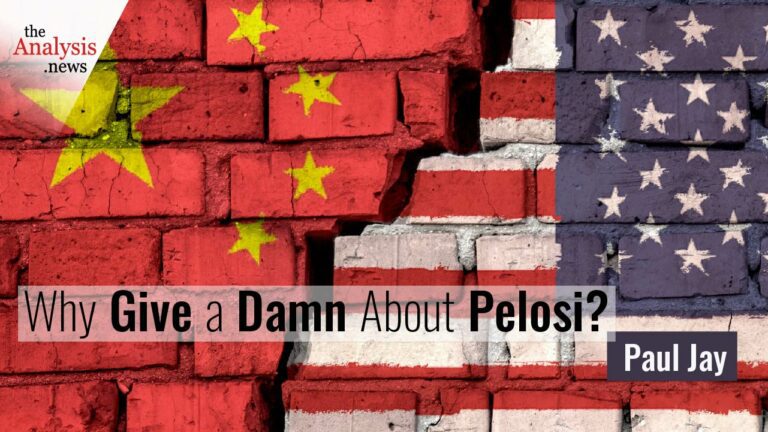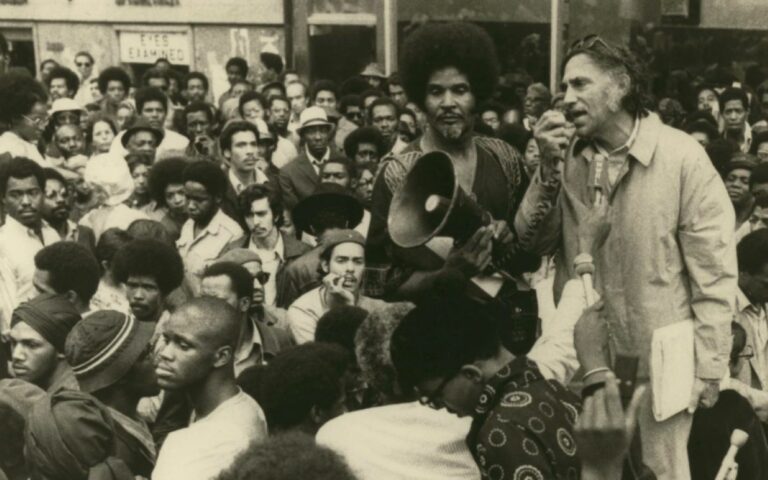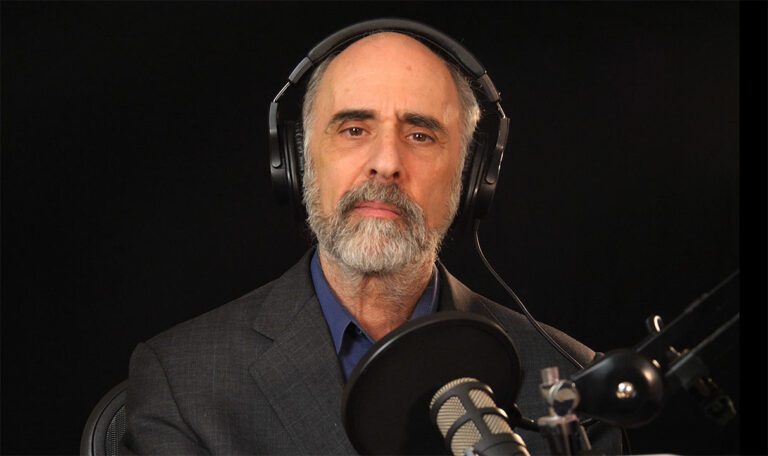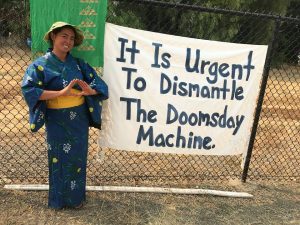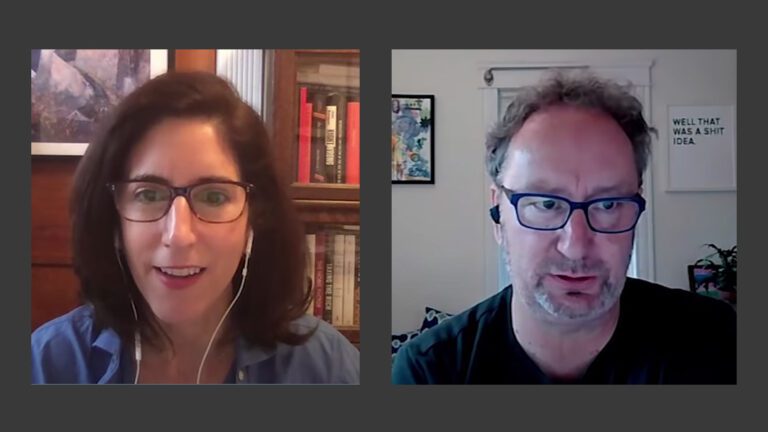This is an episode of Reality Asserts Itself, produced on December 12, 2016. On Reality Asserts Itself, Miko Peled tells Paul Jay that he’s come to understand that the Israeli occupation of Palestinian lands began in 1948, and he broke with the liberal zionist belief in the “secularization of the bible” and the mission of a Jewish state; he says BDS is an effective strategy that should be supported.
PAUL JAY, TRNN: Welcome back to Reality Asserts Itself on the Real News Network. I’m Paul Jay. I’m continuing my discussion with Miko Peled. His father was a prominent Israeli general. He wrote the book, The General’s Son. He now joins me again in the studio. Thanks for joining us.
MIKO PELED: Thank you.
JAY: So, we’re continuing on our discussion. We’re into part 3 or part 4. You really should go back and watch the beginning; get the whole context of this because we’re going to pick up the discussion where we were. You said in 2005 you came to the conclusion that this idea of a two state solution wasn’t possible nor was it right, that there should be as you said in the last segment, one state voting for all. Not a Jewish state. Now that goes against the core of your father’s beliefs because as much as he was for compromise and mitigating the occupation and so, he certainly was very much for a Jewish state. So this is a big departure for you.
PELED: Yes, it was a big departure. It was a realization that its all one state anyway already. IN other words, by taking the West Bank, Israel didn’t begin the occupation of Palestine. Israel completed the occupation of Palestine. The occupation of Palestine began when the state of Israel was established in 1948. The majority of Palestine was occupied then. Two areas that were left out were the West Bank and the Gaza Strip for reasons that had nothing to do – well that had to do only with Israeli internal politics. They decided to stop where they decided to stop and the West Bank and the Gaza Strip were delineated by Israel. 20 years later, the opportunity presents itself and Israel takes the West Bank and the Gaza Strip and from that point on, people refer to occupied Palestinian territories as just those 2 areas. And that becomes the narrative. Then for my father and people like my father who were more liberal Zionist and believed in compromise, that was where the compromise was going to be. We’re going to allow the Palestinians to establish their own state in these two areas that the state of Israel was willing to give them that were favorable to the state of Israel. So there’s really no compromise on the basic idea of Zionism, on the basic ideology, on the fact that the majority of Palestine is now Israel. But the reality is that again Israel didn’t begin the occupation in 1967, it completed the occupation and when we look at what the commanders were saying as they took the West Bank and the Gaza Strip was that we had finished the job. We completed the job that they felt should’ve been completed in 1948. The officers of 1948 were very frustrated that they didn’t take the West Bank then. But it was a political decision and it was done. Now they had the opportunity now that they’re commanders, now they’re generals, and the opportunity presented itself. They took the West Bank and by the way Golan Heights which they wanted to take anyway because the opportunity was there. What they call the so-called fog of war. That was it. From that moment on, Israel began destroying Palestinian towns and neighborhoods in the West Bank and building massively for Jews only in the West Bank. When you look back that’s exactly what Israel did 20 years earlier or from 1948 up to that point in every other place in Palestine. In the Galilee, in the Negev Desert, on the coast, everywhere. In other words, Israel building for Jews only on Palestinian land is not unique to the West Bank. It is what happens across the country. So, that was the realization that you know, that moment when I realized this has actually been happening everywhere. None of this is reversible. The only way forward if we care for justice, some sort of at least of justice for the Palestinians is to undo the state of Israel and establish a real democracy with equal rights, the Palestinians have an equal voice and that is really the only way in which Palestinians are going to have any rights. Because the state of Israel will always preclude that.
JAY: Now when you come out and say something like that, then and now but when you first, not only are you breaking with the core belief of your father but it is the fundamental core belief of the entire Israeli culture and such and the whole raise on debt of the state is based on this idea that after 2000 years and so of persecution of Jews for being Jews, there needs to be this Jewish state for the safety of Jews. You now have become in the eyes of much of Israeli society, what they like to say, especially the propaganda machine, that you are now a self-hating Jew. You are now contributing to anti-Semitism. In a way you are anti-Semitic yourself. They twist that into the self-hating thing. My point is there’s a very powerful propaganda machine and not just – even in Israel to some extent North America, it is a popular opinion. You’re more than an outcast. You’ve become an enemy.
PELED: Well you know the equation between what it means to be a Zionist and what it means to be Jewish is more relative than you think. You know in the early days, most Jewish communities rejected Zionism. Today Zionism has become – I think Brent Rosen coined this phrase – kind of the new secular religion of North American and European Jews and many others perhaps.
JAY: You might want to say that again because most people don’t know that in the early days, most Jewish committees were anti-Zionist.
PELED: Yea in the early days if we look at the Jewish culture and Jewish communities in the early days and beginning in the early 20th century and really all the way up to the establishment and the state of Israel and even beyond I would say, Jewish communities viewed the Zionists as a bunch of crazies. You know, what is this crazy idea about going to some Arab land and creating a state for Jews there. And the reality is that very few Jews went. No good Jewish family wanted their children to become Zionist. They wanted them to become good Jews and do whatever it is that Jews do.
JAY: It’s a very interesting quote from Truman in some of the papers that came out later where he – even though himself he was somewhat anti-Semitic and a certain many of his political allies were, he was actually ready after World War II to let many of the Jewish refugees into the United States apparently and was visited by some of the Zionists who talked him out of it. This thing – he says, I don’t understand these people. We want to give them refuge and the Zionists are telling us no, send them to Israel where there’s nothing.
PELED: Well the Zionists were – they were ideologic and they had an agenda. Like I said, they created this myth that the Jews are a nation and that the bible is a history book and that Palestine is the homeland of the Jews. And that all Jews are the descendants of this ancient tribe that used to live there 3,000 years ago with the ancient Hebrews. You know if you look at European Jews, if you look like me or even if you look at me, I don’t look like I have any descendants that come from the Middle East, you know. But this was the accepted story and today if you talk about North America, look at history. Look at high school history books here in the United States. When they learn about ancient times, they learn about the ancient Hebrews as the Jews. They learn about Moses, Abraham, and King David as though they were historical figures even though none of these are historical figures. They’re all biblical. So I mean this narrative really took off, really developed, and was really accepted here.
JAY: How does your father who was intelligent, bright, secular man who’s not religious. How do you take the bible as a history book?
PELED: Well that’s exactly it. They secularized the bible. The Zionists secularized the bible. So they adored King David and they adored all these other figures and they made them sound like they were completely secular. And they tied them in to their own kind of secular Zionist socialist national socialist I suppose in a way, ideology, which is what Zionism was and what Zionism is. And they hated the Arabs. But even more than the Arabs, they hated the orthodox Jews who rejected Zionism, and they hated Jewish communities.
JAY: Again, something a lot of people don’t know. Most of the orthodox Jews rejected Zionism back in that day.
PELED: Back in that day until there was some kind of compromise between some of the orthodox communities who became Zionists. But the main core of the orthodox communities rejected and many still do – the idea of a Jewish state. And Jewish communities who wanted to remain where they were. Who were happy to be in Europe or in America or wherever it is that they were, in Iraq and so forth, and showed no interest in coming.
JAY: So you know when you start speaking like this, you’re going to be a target. What in you does that keep your Karate school going? I mean why do you – I understand your niece was killed in the bombing and I understand reacting to it. But you are now making yourself a target rather than just living your life.
PELED: Well this is my life. I think it was kind of under – I kept it hidden and kept it under control in a way under the surface as long as things were I suppose, working fine. But after she was killed and then peace talks fell apart in 2000 and thing after thing after thing, it just, it was something in me that I had very little control over. And I don’t see myself as a target as all. What I see is that for reasons that I don’t fully understand because my father was a general and the background that I have, that gives me a voice. And if I can use that voice to say these things and bring about some kind of sanity and bring about some kind of justice back to Palestine, then I’m doing the right thing. So really it wasn’t until my book came out in 2012, the end of 2012 that I kind of moved beyond teaching karate and this became what I do full time is writing and speaking and so forth, and traveling about this issue and going to Palestine and causing as much trouble as I can while I’m there. That’s really what I do now. But I feel that this is – I don’t feel I’m targeted. Quite the opposite actually.
JAY: Israeli propaganda machine, Zionist propaganda machine, obviously as everyone knows, labels just about any critique of Israel as anti-Semitic. But some critique of Israel is motivated by anti-Semitism. I wonder does that not get enough attention? Especially when one is trying to talk to ordinary Israelis or North American Jews?
PELED: You know the idea of Israel, the ideology that established Israel, the reality in Israel is racist and racism. Supporting Israel is supporting racism. You know it’s like supporting apartheid in South Africa is supporting racism. Supporting mass incarceration of blacks in America is racism. There’s certain things that are just racism. There’s no compromise. There’s no gray area. There is no way that you can support Israel and not be racist. Because it is a racist project. It’s a racist colonial project and it’s brutally violent. I think if we start describing the violence and the racism and the laws, people wouldn’t believe it, it’s so horrifying. So, that is my issue. That we need to get rid of that particular racism. Now the fact that some people hate Jews as well as Arabs, as well as blacks? Well fine. The racism goes all around. Usually racism is kind of colorblind in a way. People hate Jews, they hate blacks, they hate everybody else. That’s fine. The point is that this is racism. There is no way to support a Jewish state in Palestine without supporting stepping all over the rights of Palestinians.
JAY: Yea and I wouldn’t disagree with that. But what I’m saying is that some of the anti-Zionist rhetoric is coming from sources that are really thoroughly anti-Semitic and it kind of converges with the legitimate critique of –
PELED: That hasn’t been my experience. The people that I work with, the people that I talk talk to, the people that I meet, the people that I engage with in conversation and with conferences, that hasn’t been my experience at all. I haven’t seen that. I’ve heard about it.
JAY: I’m not talking so much within the circles, I would think you’ve traveled in.
PELED: And perhaps there is. But again that hasn’t, that’s really not something that’s come across that I’ve experienced or seen so I don’t really know how to comment. I know that people say that. I know that people claim that that exists. I haven’t seen it. It’s not been in front of me in any place.
JAY: Talk a bit about BDS, Boycott Divestment Sanctions. Certainly it seems to be having a heck of a lot more effect these days than I think a lot of people thought it would in the beginning. You’re involved in it. Where do you think it’s at and how much influence or effect is it having on the Israeli state?
PELED: Well my involvement in it is that I’m a big supporter. I’m not so much in the inner works of it. But the call to boycott divest and impose sanctions on Israel, came from Palestine. It came from Palestinian civil society. Probably the largest coalition of Palestinian organizations and groups and individuals that were put together. Came out with this call resting on the experience of South Africa where BDS had a big part in bringing down apartheid and saying this is how you’re going to help them. This is how people around the world can gather together and support the calls for justice in Palestine. It’s proven to be very dedicated, very principle of course it’s nonviolent. Israel tries to paint it as though it’s terrorism and it’s violent. There’s nothing violent about it at all. The reason it’s being successful is because of its dedication and because of the fact that the people are involved are principle. And it’s working because again it’s a smart form of resistance. Now they’ve had several campaigns which have gone very well against the caterpillar and for us, now against HP. The level of – I do agree. I don’t think that anybody anticipated that it would be this powerful at this point and I’m glad it is. I wish it was more powerful. We know that the APAC convention, every presidential candidate talks about BDS as though it’s a terrorist threat. As though it’s something that has to be killed and destroyed. Israel just had a major conference on how to fight BDS. Israeli channel 10 news came here to the US and did a 5 part series about the BDS in America and how is it that our good friend America allows this anti-Semitism to take over and so on. The interview meeting between many Jewish activists here in the US. So, it’s definitely gaining ground. It’s doing the right thing and I think the thing that bothers Israel the most or maybe several things, one is that you can’t kill it because it’s not armed. So, they don’t really know what to do with it. The other thing is that there is a sense that it is working. In other words, Israeli academics feel isolated. Israeli products are being taken off shelves. The campaigns, the BDS campaigns are working and they’re gaining a lot of ground and there’s a sense of that there’s a legitimacy to Palestinian resistance. If there’s a legitimacy to Palestinian resistance, that is biting away from the legitimacy of the state of Israel. You know, the two go hand in hand and like I said earlier, the legitimacy is the holy grail. We cannot let that go. Israel will kill and destroy in order to maintain and protect the legitimacy. This is what they’re trying to do. But I believe they’re failing. They’re spending hundreds of millions of dollars trying to fight BDS and trying to fight what they call [inaud.] BDS which is the all the Palestine solidarity that exists and they’re failing miserably. I mean the conversation on campuses. With students for justice in Palestine all over the US, is growing, is improving, is becoming much more vigorous today than anybody would’ve thought would ever take place on campuses and in churches in America. Like I said, it’s dedicated, it’s the right thing to do and it’s we’re only scratching the surface.
JAY: So, in the beginning of the series of interviews I quoted Alice Walker who said your book left her hopeful. What leaves you hopeful in all of this? How do you end up hopeful?
PELED: Well because I think the transformation of this very violent and racist regime that is controlling Palestine today which is what we call the state of Israel, the transformation of that into a secular democracy with equal rights is inevitable. I think it’s –
JAY: Why?
PELED: Well I’ll give you several reasons. To begin with, the reality’s unsustainable. You have over 2 million people living in the Gaza Strip. The population of Gaza Strip just went beyond 2 million a few weeks ago. Now the Gaza Strip for anybody who doesn’t know is a 5 minute drive from Israeli towns and cities inside of Israel. You have 2 million people living in one of the most densely populated areas of the world with no access to clean water. With no access to basic most healthcare. With very little access to nutrients, to food. They’re already food insecure which is by United Nations definition, one step before hunger and a child in Gaza with a curable cancer will die while a child 5 minutes away in Israel of the same curable cancer will live. This is a reality that cannot be sustained.
JAY: The Israelis sure seem to think it can as long as it’s supported by the American state and the American state seems to have no problem with what’s going on in Gaza. When Netanyahu comes to congress, everyone stands up and gives what? 25 standing ovations.
PELED: Well you know they used to talk about Nelson Mandela as a terrorist in the late 80’s and the United States still did not support boycotting South Africa as late as the late 80’s. In 1994, Mandela was already president of South Africa. So these things when they start to change, they change very fast. I think the reality on the ground is unsustainable regardless of what Israelis might think or regardless of what American politicians might think. It is not sustainable.
You have a population within Israel proper they’re Israeli citizens who are Palestinians who live in what can only be described as refugee camps in some cases. Some of the towns in the neglect and the racism is really something that people rarely talk about and need to talk about. An entire population of citizens who live really under the Israeli Secret Police. You’ve got this reality in the West Bank where Palestinian ghettos are being created. It is not sustainable. The majority of the population are Palestinians right now, between the river and the sea. BDS is growing. Palestine solidarity is growing. The Palestinian resistance is gaining more and more support and more respect. You’ve got noble [inaud.] and you’ve got big names, Alice Walker and others, Roger Waters, supporting the Palestinian cause. There is a momentum here that cannot be stopped. I will be surprised if that takes more than 10 years for this process to actually take place.
JAY: Well from your lips to god’s ears. Thanks for joining us.
PELED: Absolutely.
JAY: And thank you for joining us on the Real News Network.
Never miss another story
Subscribe to theAnalysis.news – Newsletter
“Miko Peled is an Israeli-American activist, author, and karate instructor. He is the author of the books The General’s Son: The Journey of an Israeli in Palestine and Injustice: The Story of the Holy Land Foundation Five. He is also an international speaker.”



